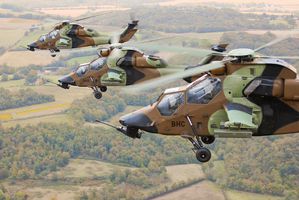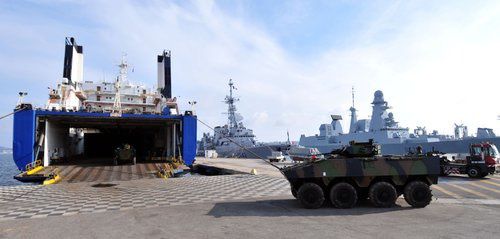
01.22.13 By David Axe - wired.com/dangerroom
The French-led international assault on Islamist-held northern Mali is about to get a lot more explosive. With a big assist from the U.S., U.K. and other allies, Paris is deploying heavier vehicles, high-tech artillery pieces and France’s most sophisticated helicopter gunship, the Tiger.
The reinforcements reflect France’s surprise at discovering that Mali’s rebels possess some dangerous weaponry of their own.
“The defense minister has recognized that the enemy resistance was tougher than initially envisioned,” Joseph Henrotin, a French analyst and military academy instructor, tells Danger Room. When French ground troops counter-attacked towards the battleground town of Konna in central Mali on Jan. 15, they encountered rebels equipped with “technical” trucks. Photos have depicted militants riding in a wide variety of these improvised, gun-armed pickups, long a mainstay of African warfare.
“Our enemies were well-armed, well-equipped, well-trained and determined,” an unnamed French diplomat told Ireland’s RTE News.
French air force Mirage and Rafale fighter-bombers destroyed some, but not all, of the Islamists’ vehicles. That left the survivors to face the combined French-Malian ground assault, which has been carefully maneuvering northward from the capital of Bamako since the middle of last week. (One leg of the advance is depicted in Paris’ official video release, above.)
Stiff rebel resistance was not entirely unplanned for, according to Gen. Bertrand Clément-Bollée, commander of French land forces. Clément-Bollée told one French defense blog that Paris had designated a series of increasingly heavy army formations for potential intervention in Mali. The first were the lightweight troops of France’s small, but permanent, African garrisons in Mali, Chad, Burkina Faso and other countries. Under the French army’s “Cheetah” deployment model, paratroopers, helicopters and two mechanized brigades based in France were also in line to deploy to Mali as needed, the general said.

According to Clément-Bollée, the first of the Cheetah forces activated shortly after the Jan. 11 opening salvo. “We had a very rapid need for a company of the 92nd Infantry,” he revealed. The 92nd is equipped with the wheeled Véhicule Blindé de Combat d’Infanterie, a sort of light tank armed with a 25-millimeter cannon. Twenty or so of the 26-ton VBCIs were airlifted into Mali to join the lighter armored cars and recon vehicles belonging to the garrison units.
The French army’s 5th Regiment, which operate the Tiger gunship — Europe’s answer to the U.S. Army’s Apache — began arriving in Mali last week, Clément-Bollée said. Older Gazelle gunships participated in the first wave of French air attacks on rebel troops. One of the Gazelles was hit by gunfire and its pilot died. Compared to the Gazelle, the Tiger boasts heavier armor and weaponry and more sophisticated long-range sensors, allowing it to shoot from greater distance.
The heaviest Cheetah forces for Mali include: two more companies of VBCIs plus a number of Leclerc heavy tanks plus units equipped with the Caesar, an ultra-modern, truck-mounted 155-millimeter artillery piece.

Henrotin says the first Caesars bound for Mali are “currently underway.” The French magazine Le Progrés appears to corroborate this claim with a photo depicting artillerymen from the 68th Regiment, which possesses Caesars as well as mortars and other equipment, preparing to go to Mali.
But it’s unclear if the soldiers were taking the heavy guns with them or just mortars. Clément-Bollée, for his part, seemed reluctant to list in detail all the Mali reinforcements. “Our enemies also read,” he said.
In any event, Paris lacks the airlift capacity to haul all the hardware bound for Africa. “At the strategic airlift level, the capability gap has been since long considered as problematic,” Henrotin says. Early on, Paris appealed for help from allied nations. Canada and the U.K. were the first to offer up C-17 transport planes — one and two, respectively; the U.S. sent five of its own C-17s over the weekend. The four-engine C-17 is big enough to carry a Caesar and any other French vehicle.
Besides the transport planes, Washington has not yet agreed to contribute any other forces to the fight. “Our support of French operations in Mali does not involve what is traditionally referred to as boots on the ground,” Pentagon spokesman George Little said. As Paris escalates its involvement in Mali with heavier and more powerful weaponry, it does so without the guarantee that if the battle turns against the French, allied nations will rush to the rescue.





